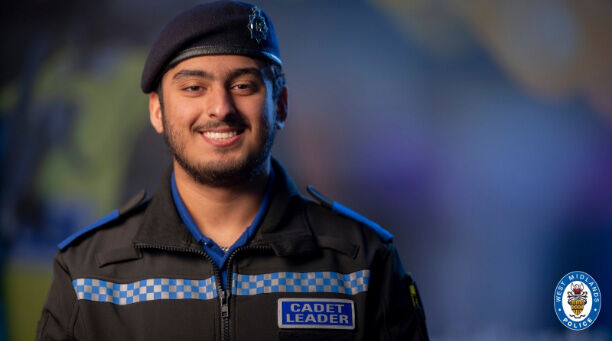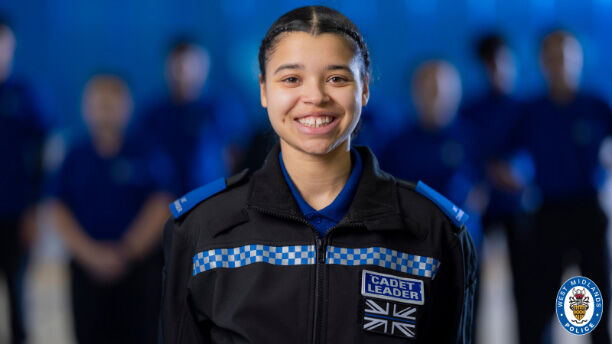
Professional Policing - BSc (Hons)
Currently viewing course to start in 2026/27 Entry.
This course is a national pre-join degree course licensed by the Policing Professional Body, the College of Policing and will be delivered by subject matter experts and experienced practitioners (including retired police officers) with a wealth of subject expertise to prepare you with key transferable skills required for the role of Police Constable....
- Level Undergraduate
- Study mode Full Time
- Award BSc (Hons)
- Start date September 2026
- Fees View course fees
- Subject
- Location City Centre
This course is:
Available with Professional Placement year
Open to International Students
Overview
This course is a national pre-join degree course licensed by the Policing Professional Body, the College of Policing and will be delivered by subject matter experts and experienced practitioners (including retired police officers) with a wealth of subject expertise to prepare you with key transferable skills required for the role of Police Constable.
This course has been developed through consultation with a range of police service areas and the College of Policing, to give you the opportunity to examine the fundamental concepts of policing whilst also developing the practical and transferable skills you need for a career in law enforcement.
What's covered in this course?
The course will help to develop your critical thinking about policing, policy and practice through complementary modules encompassing the theory and principles of operational policing, legislation and police powers, structured interviewing skills and much more. To develop these skills, you will be involved in practical activities, events and will be exposed to a range of guest speakers. These speakers will be from a range of criminal justice and public sector agencies as well as police officers of all operational levels.
The course will utilise a range of exciting and innovative forms of assessment which match the working practices within policing. You will also be supported in applications for job roles within policing and will have opportunities to take part in mock assessment centres, fitness and team building exercises.
You will also benefit from a partnership between the university and West Midlands Police (WMP). The organisation has agreed to support with the training of twenty five special constables both within the service settings and on campus. WMP will provide support and guidance through both the assessment and training stages so as to ensure students feel capable and equipment to face a variety of incidents and issues.
This course will combine all of these elements together whist offering you the opportunity to take part in a work placement which could be within a variety of areas in the field community safety and criminal justice. You will be encouraged to take part in to visit courts, police training establishments and prisons.
The course material will help develop a professional focus and real world experience, ensuring that upon graduation, you are equipped to make an impact in your chosen career. The course teaching team will also provide additional support sessions to refresh you on academic and research skills so as to ensure you are fully prepared to carry out independent research projects throughout the course.
Successful attainment of the BSc in Professional Policing does not in itself provide any guarantee of recruitment as a trainee Police Constable. Each police force within England and Wales sets out its own recruitment process and selection policy and entry requirements vary from force to force. You are therefore strongly advised to check the specific requirements of their chosen force prior to undertaking study. It is also important to contact local force areas and the college of policing to ensure that you are fully familiar with the eligibility criteria and any barriers which may inhibit you becoming a police officer.
Professional Placement year
This course offers an optional professional placement year. This allows you to spend a whole year with an employer, following successful completion of your second year, and is a great way to find out more about your chosen career. Some students even return to the same employers after completing their studies.
If you choose to pursue a placement year, you will need to find a suitable placement to complement your chosen area of study. You will be able to draw on the University’s extensive network of local, regional, and national employers, and the support of our Careers teams. If you are able to secure a placement, you can request to be transferred to the placement version of the course.
Please note that fees are payable during your placement year, equivalent to 20% of the total full-time course fee for that year.
Why Choose Us?
- We pride ourselves on being the University for Birmingham and our commitment to contribute to the city and local community. As part of this commitment, we have forged strong links with local organisations across the city and many graduates end up playing valuable roles in the local community.
- We have strong links with West Midlands Police and the British Transport Police and regularly welcome serving officers from national and international police forces and experts from the criminal justice system and charities to give guest lectures and provide opportunities for exposure to real-world activities.
- We have a strong focus on employability and through placement opportunities and our links with local businesses, we aim to ensure you graduate not only with your degree but also with the skills and knowledge needed to embark on your chosen career.
- We focus on giving students real-world experience during their studies. As such, we welcome a number of expert guest speakers including serving police officers and former students who have gone on to have successful careers in the police.
Open Days
Join us for our next Open Day where you'll be able to learn about this course in detail, chat to students, explore our campus and tour accommodation. Booking isn't open for the next event yet. Register your interest, and we'll let you know as soon as booking goes live.
Next Open Day: Friday 26 June
Entry Requirements
Essential requirements
112 UCAS Tariff points. Learn more about UCAS Tariff points.
If you have a qualification that is not listed, please contact us.
Fees & How to Apply
UK students
Annual and modular tuition fees shown are applicable to the first year of study. The University reserves the right to increase fees for subsequent years of study in line with increases in inflation (capped at 5%) or to reflect changes in Government funding policies or changes agreed by Parliament. View fees for continuing students.
Award: BSc (Hons)
Starting: Sep 2026
- Mode
- Duration
- Fees
- Full Time
- 3 Years
- £9,535 in 2026/27 ✱ Important note for this price
- Apply via UCAS
(↩Back to price) * The Government is proposing to apply an inflationary increase to regulated tuition fees for 2026/27 and the University is planning on increasing fees to that maximum level once confirmed.
International students
Annual and modular tuition fees shown are applicable to the first year of study. The University reserves the right to increase fees for subsequent years of study in line with increases in inflation (capped at 5%) or to reflect changes in Government funding policies or changes agreed by Parliament. View fees for continuing students.
Award: BSc (Hons)
Starting: Sep 2026
- Mode
- Duration
- Fees
- Full Time
- 3 Years
- £18,570 in 2026/27
Guidance for UK students
UK students applying for most undergraduate degree courses in the UK will need to apply through UCAS.
The Universities and Colleges Admissions Service (UCAS) is a UK organisation responsible for managing applications to university and college.
Applying through UCAS
- Register with UCAS
- Login to UCAS and complete your details
- Select your course and write a personal statement
- Get a reference
- Pay your application fee and submit your application
Guidance for International students
There are three ways to apply:
1) Direct to the University
You will need to complete our International Application Form and Equal Opportunities Form, and submit them together with scan copies of your original academic transcripts and certificates.
2) Through a country representative
Our in-country representatives can help you make your application and apply for a visa. They can also offer advice on travel, living in the UK and studying abroad.
3) Through UCAS
If you are applying for an undergraduate degree or a Higher National Diploma (HND), you can apply through the UK’s Universities and Colleges Admissions Service (UCAS).
You can request a printed form from your school or nearest British Council office. You will be charged for applying through UCAS. Birmingham City University’s UCAS code is B25 BCITY.
Personal statement
The personal statement gives you a crucial opportunity to say why you’re applying and why the institution should accept you.
Here are the three areas you’ll need to address:
- Why do you want to study this course or subject?
Here’s where you explain what makes this course exciting to you. Think about your motivations for studying the course and your future plans. If you’re planning to take a year out, don't forget to give your reasons.
- How have your qualifications and studies helped you to prepare for this course or subject?
This is your chance to show what you’ve learned at school or college. You should include the skills and knowledge you’ve gained from education or training and how this will help you succeed in your chosen course.
- What else have you done to prepare outside of education, and why are these experiences useful?
Not everything you’ve learned comes from the classroom. Life experience counts too! You might want to talk about work experience, employment, or volunteering and how they’ve helped you develop the skills needed for your chosen course or future career.
Worried about Personal Statements?
If you've got no idea where to start or just want to check you're on the right track, we’ve got expert advice and real examples from our students to help you nail your personal statement. You can even download our ultimate personal statement guide for free.

Financial Support
We offer further information on possible undergraduate financial support. This includes the type of loans, grants and scholarships available both from the government and from Birmingham City University.
Course in Depth
First Year
In order to complete this course, you must successfully complete all the following CORE modules (totalling 120 credits).
This introductory module covers key ideas and concepts that are essential in developing an understanding of the fundamental aspects of how police services in England and Wales are structured, delivered and governed. The module will introduce you to the history and development of both the police service itself and to its growth as an academic discipline. You will explore the concepts of the meaning of police work and, by exploring several case studies, will develop an understanding of how policing in England and Wales has radically changed over time and how it continues to evolve and adjust
The module covers key ideas and concepts related to models of policing and models of intelligence. You will examine the historical underpinning of policing models, their development, purpose and function in managing criminal behaviours, and explore the impact of intelligence within a wider policing context.
The module covers key ideas and concepts that are essential in developing an understanding of the fundamental aspects of the study of crime and its control. You will explore the concept of “crime” and, by exploring several case studies, will develop an understanding of how it can change over time and from place to place.
This module considers the different forms of forensic evidence and the variety of methods and practices of forensic science. You will explore the theories and academic debates surrounding current practice and examines the value of forensic evidence in criminal investigations.
The aim of the module is to equip you with a detailed understanding of how research evidence can inform practice in policing contexts. The fundamentals of Evidence-Based Policing will be examined, with reference to real-life examples in order to highlight the benefits, issues and challenges associated with EBP approaches. Coverage will include consideration of police decision-making, and how effective working can be facilitated through the use of evidence.
The module covers key ideas and concepts that are essential in developing an understanding of the fundamental aspects of the study of equality, diversity and inclusion and measures used by police forces and agencies to manage engage with minority groups. The module will examine the definitions of equality, diversity and inclusion and how forces embed these terms into daily practice, strategy and policy.
Second Year
In order to complete this course, you must successfully complete all the following CORE modules (totalling 120 credits).
This module considers a variety of relevant criminal statutes and police powers and how they apply within the wider criminal justice system and applied practice. It particularly explores the police’s role within the criminal justice system and the importance of the proportionate and necessary application of the criminal law to effective service delivery. The module provides knowledge and critical understanding of the uses of police powers within a liberal democracy and the concept of legitimacy and policing by consent.
This module explores key terms around professional ethics within policing and investigates the challenges found within tactical, operational and strategic conditions. Students are given the opportunity to critically assess a wide-range of subject matters, including case-studies and ethical dilemmas, in order to enhance understanding and promote further learning. The evaluation and use of ‘policing industry’ process models are also highlighted, including the National Decision Model. This emphasises the importance of ethical, effective and risk-based decisions and outcome focussed approaches.
This module applies a variety of effective investigative interviewing practices regarding victim, witness and suspect interviews. Students evaluate various interviewing models, tools and approaches that retain the concepts of obtaining best evidence for criminal investigation and court processes. Cognitive approaches are highlighted, along with the application of advanced techniques that support interviewees in memory recall and in student understanding of the psychological and environmental characteristics of memory construction.
This module focuses provides students with the practical and theoretical understanding of the skills required to pass the police application process in England and Wales. It is designed to improve your employability prospects and is focused on the development of core skills, qualities attributes, and personal reflection. It draws on practical assessments such as mock assessment centre tasks, a personal skills audit and bleep test amongst others. This module is co-delivered with Police Forces.
The module covers key ideas and concepts that are essential in developing an understanding of the fundamental aspects of the study of vulnerability and measures used by police forces and agencies to manage public protection. Discussion will be had into the historical context of care within society and how abuse and exploitation of vulnerable groups can take place. Students will explore the causal factors behind domestic and violence and abuse within both the home and wider society.
This module focuses on the development of practical and research skills required to excel as an office. During the first part of the module, you will engage in skills-focused role-plays and immersive simulation activities to build vital skills such as communication skills and conflict resolution and de-escalation skills. During the second part of the module, you will undertake a group applied research project. This module encourages reflexivity.
In addition to the curriculum content, a range of support workshops will be provided throughout the second year in order to ensure that you are equipped to implement research methodologies to conduct an independent research project in year three. These will be non-credit bearing and will be delivered through workshops, lectures and independent tasks which will be accessible through virtual learning environment systems.
You will also be allocated a support mentor, who will guide you into discussing potential research topics for your independent research project.
Professional Placement (Optional)
In order to qualify for the award of BSc (Hons) Professional Policing with Professional Placement Year you must successfully complete the following module.
This module is designed to provide you with the opportunity to undertake a credit bearing, 40- week Professional Placement as an integral part of your Undergraduate Degree. The purpose of the Professional Placement is to improve your employability skills which will, through the placement experience, allow you to evidence your professional skills, attitudes and behaviours at the point of entry to the postgraduate job market. Furthermore, by completing the Professional Placement, you will be able to develop and enhance your understanding of the professional work environment, relevant to your chosen field of study, and reflect critically on your own professional skills development within the workplace.
Final Year
In order to complete this course, you must successfully complete all the following CORE modules (totalling 100 credits).
This module investigates the core issues within police leadership, management and organisational effectiveness. These areas focus on the tactical, operational and strategic practices and theories within contemporary police leadership. Students will also critically evaluate the challenges of police leadership from the further perspectives of critical incident command, equality and diversity and human resourcing practices.
The module provides students with the opportunity to carry out a substantial and self-directed critical investigation of a specific topic within Policing and Investigation. Students will understand the varying methods of research, including a range of approaches used to analyse and evaluate a specific topic area. For the module, students will be allocated a supervisor who will provide project specific guidance and direction throughout the course of the year.
The aims of the module are to critically examine the future landscape of policing in England and Wales. Some of these discussions will examine budget cuts and reductions in resources and explore whether this will continue and what implications this would have on managing crime. It will explore the impact of digital technologies within policing and the heightening of moral panics and public fears around specific crime types. The transnational nature of society means that police services in England and Wales are increasingly working with forces from all over the world and the legislative and organisational difficulties will be explored. The module will explore the changing roles and function of officers and whether these trends will continue or whether a reversal of thinking will take place. Including in this will be the increasing use of educational to improve professionalism with reference made to the impact of the national college of policing.
This module will provide you with a detailed look at the theories that surround terrorism and chart how these have developed through an engagement with a range of far-reaching discussions and different events across the concept’s history. Discussion and debate surrounding issues such as the definition, history and causes of terrorism as well as highlighting the divergence that exists between “orthodox” and “critical” schools of thought will allow you to engage in an authoritative and critical manner with this topic of tremendous contemporary significance. The module will discuss police and agency responses to terrorism, including the use of intelligence to identify and target known risk groups.
In order to complete this course a student must successfully complete at least 20 credits from the following list of OPTIONAL modules.
This module explores community policing and crime prevention in a contemporary society. You will consider the role of community policing and how it can be achieved in practice in light of the challenges of policing in the 21st Century. You will explore both crime prevention theories and the adoption of specific initiatives such as trauma-informed approaches to policing.
This modules allows students to gain real life experience in a range of different private, public and third sector organisations. The module provides a framework for integrating the principles, tools, theories and methods learnt on policing degree and offers students a degree of freedom to develop a project related to community policing. Rather than writing a research based dissertation, students write a research project report, outlining the aims, objectives, outcomes of their part in a specified and approved community live project, and produce a reflexive learning diary which considers their learning, growth and development as part of the project team and the challenges and opportunities working with others.
All core modules are guaranteed to run. Optional modules will vary from year to year and the published list is indicative only.
Download course specification
Download nowTeaching and Learning Strategy
Students enrolled on to this course will engage with a range of teaching and learning strategies. The teaching and learning arrangements may vary across modules, depending on the subject matter being addressed and mode of assessment.
Assessment
The course will use a range of authentic assessment methods in order to reflect current working practices within policing. In all group activities, you will be assessed individually as well as part of a group so as to fairness is applied throughout. This will ensure that you contribute equally to your groups' overall grade but staff can award higher or lower grades to those who may have contributed/not contributed to the assessment.
Employability
The BSc in Professional Policing is an academic knowledge-based degree, based upon the national curriculum for the police constable role. It will provide you with an entry route into policing if you wish to study before you apply to join a police force. We offer students dedicated support with the application process to give you the best chance of success.
Your education will continue in force if you become a probationary police constable (see below). If you wish to use a pre-join degree as your entry route to the police service, you must apply to join a police force within five years of your graduation.
The pre-join degree may also be of interest or benefit to those considering a career in other roles within policing, for those seeking to understand how society is policed, for those who have an interest in law enforcement or for those want to enter the wider justice sector.
Please note: successful achievement of the pre-join degree does not provide any guarantee of recruitment as a probationary police constable. Each police force sets out its own recruitment process and selection policy; the entry requirements vary from force to force. Prospective students are strongly advised to check the specific requirements of their chosen force before undertaking study.
How do I apply to become a police constable?
Once you have graduated with a pre-join degree, you will need to apply to join your chosen police force as a probationary police constable. To do this, you must:
- Apply within five years of your graduation date
- Meet all of the recruitment criteria for the particular force.
Once you have successfully joined a force as a probationer, you must then:
- Undertake further practice-based learning and assessment in your force
- Demonstrate competence in the police constable role
- Complete the two-year probationary period, in line with police regulations.
The range of both interpersonal and academic skills you will develop studying the BSc in Professional Policing will help to support your future career aspirations. Whether you pursue a career in policing or choose instead to take on roles in other sectors, the broad range of assessments, experiences and team activities that you will take part in, will provide to be valuable in future employment.
Special Constable Training (West Midlands Police)
As part of a business relationship developed between the university and West Midlands Police (WMP), you will be given an opportunity to align your studies to training to become a special constable (SC) with WMP. Some of the SC training will be done by WMP at their training facilities and some will be provided from within the course content. This is an exciting and creative opportunity to enhance career potential for a whole range of graduate roles and employment sectors.
Sahib Gahir
Alongside his studies, Sahib is a Cadet Leader with West Midlands Police. He volunteers his time to mentor and support our young police cadets, gaining useful experience and skills for his future career as a police officer.
Natalya Fernandez
Natalya volunteers as both a Cadet Leader with West Midlands Police and High Sherriff Cadet Ambassador. In these roles, she inspires and supports younger cadets, while gaining valuable leadership experience. She has also helped support many community events and raised money for charities.
In addition to roles within the police, Professional Policing graduates have gone on to secure successful careers such as Intelligence Analysts, Prison Officers and even Paramedics.
We offer opportunities for further study as well through our MA in Policing and Intelligence.
Facilities & Staff




Our Facilities
We are constantly investing in our estate and have spent over £500 million on new learning facilities.
The Curzon Building
This course is based in the Curzon Building, a £63 million development, located on our City Centre campus.
The building offers students a unique social learning space, including a dedicated student hub incorporating student support services, in the heart of Birmingham’s Eastside development.
Realistic, simulated environments include two mock court rooms, a Magistrates' and Crown Court, and an interviewing suite. We’re also exploring the use of virtual environments as a way to develop case study analysis.
For those studying on the BSc (Hons) Professional Policing or BA (Hons) Criminology, Policing and Investigation degrees, you’ll experience simulations of police interviewing environments for both suspects and witnesses, with access to tape recording and video playback analysis. You’ll also be able to utilise our unique mobile crime scene to simulate true-to-life and interactive situational simulations.
Crime investigation files are prepared using computer-based technology, and the crime data analysis requirements of the degree are supported by appropriate statistical and analytical software.
Psychology students can look forward to using state-of-the-art equipment as well, including the latest in eye-tracking software, and our new EEG machine, all geared towards giving you true hands-on experience with tools you’ll be using in your later career. You will also benefit from facilities across the wider campus including the Parkside and Millennium Point buildings.
The Curzon Building also features:
- An impressive library with access to over 65 million full text items and stunning views of Eastside City Park
- Your Students’ Union which is located in a beautifully restored 19th century pub, The Eagle and Ball
- A modern 300-seat food court with space to study and socialise
- Accessible IT facilities with full Office365 for all students for free
- Shared facilities with the wider campus including the Parkside Building and Millennium Point
Our staff
Sharda Murria
Senior Lecturer in Policing & Criminology, Course Leader for Policing
Sharda Murria is a socio-legal scholar who teaches Policing and Criminology. She has a keen interest in policing and the criminal justice system, and is passionate about delivering ‘real world impact’.
More about ShardaSteve Wadley
Senior Lecturer in Policing
Steve spent 8 years as an Authorised Firearms Officer with the Ministry of Defence Police (MDP) before making the transition to a lecturer within the FE/HE sector.
More about SteveRon Winch
Associate Professor
Prior to taking up appointment with BCU, Ron Winch served for over thirty years with the Metropolitan Police Service and West Midlands Police. These included front-line CID roles, as well as senior command roles in local policing, public order policing, firearms policing and as a senior investigating officer for major and complex crime, including...
More about RonZoe Rodgers
Lecturer in Criminology and Policing
Zoe joined Birmingham City University as a Lecturer in Criminology and Policing following over eight years at Sheffield Hallam University as a student and Associate Lecturer in Criminology and Policing. She brings a wealth of knowledge based on her ten research positions held within Sheffield Hallam’s Institute of Law and Justice and her PhD based...
More about Zoe


